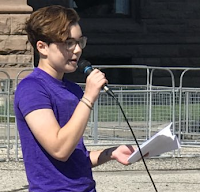 All summer, concerned citizens have been demonstrating against recent large-scale changes to the
All summer, concerned citizens have been demonstrating against recent large-scale changes to theOntario curriculum. On September 21st, tens of thousands of students from across the province walked out of their classrooms en masse in protest of these new changes. On the 23rd - a week ago today - over a hundred protesters came out to Queen’s Park to make their voices heard about the issue. And the movement is nowhere near over.
“Many people my age... have learned more about topics like consent and sexting from the controversy surrounding the government’s actions than from the curriculum itself,” pointed out Sara Escallon-Sotomayor, an activist, graphic designer, and grade 11 student, at Sunday’s rally. To add to this, the Ford government has established what some are calling a “snitch line” for parents to report teachers who are teaching past the so-called “updated” curriculum standards. Teachers’ and students’ jobs are being made much harder by a 100 million dollar cut to Ontario’s school repair budget. Lastly, but most certainly not least, the new provincial government has cut funding for a program which has been trying to increase and update discussions of First Nations history upon the recommendation of the Truth and Reconciliation Committee. Teachers are still trying to make these consultations happen, but without funding and official support, they’re having a much harder time of it.
The sit-in in Queen’s Park was a direct response to the success of the walkout. The vast majority of the attendees were high school students, angry about their treatment at the hands of their own government. Many felt left out of their own education and that their voices were being passed over. As Chloe Lederman, an organizer of the student activism group Not Just Rumors pointed out: “When you say you’re for the people, Mr. Ford, which people are you talking about? Because it’s certainly not the students, and it’s certainly not people of colour, and it’s certainly not the LGBTQ+ community, and not women... so I guess that leaves older, white, straight men. I guess you’re really just in it for yourself.”
And it isn’t just a question of being included - for many students, the curriculum change poses a question of safety. “Doug Ford is sending a message that we don’t matter, that we’re too controversial to talk about in the classroom. I don’t want to go to school in fear... My parents were scared about what would would happen to me when I first came out, but now they’re scared again,” said Noah, a trans student who has filed a human rights complaint about the curriculum change. Fischer-Quann talked about her own experiences with public sexual harassment in a very poignant and personal argument for why good sexual education is so necessary. “I get sexually harassed or assaulted almost every day. Sometimes I’m scared to go outside, and sometimes I think of how different my life would be if any of [the men who’ve done this] had learned about consent in school.”
Although high school students composed the majority of the body at Queen’s Park, they were by no means alone. Gordon Nore, a teacher from William Burgess Elementary School, talked about the personal responsibility he felt to support this cause. “It’s up to the teachers to actually be teaching this material. It’s not up to, for instance, the young trans student Noah to be doing Trans 101 in their classroom... Noah’s only job in school is to tell Noah’s story like any other other student should tell their story. I guess, my message is, keep after us, ‘cause I want to see more adults and teachers out supporting you all.” A few politicians, like Marit Stiles, the NDP education critic, came out to spoke at the event as well. “I really feel like students shouldn’t have to miss school to have their voices heard,” she told a cheering crowd. “Students shouldn’t have to walk out of school to have grown-ups, like Mr. Ford, listen to their perspective on the issues that affect them the most directly!”
More than ever before, adults across Ontario are listening to students’ voices. The general population has been caught off-guard by the empowerment, drive, and passion they are seeing from youth - from teenagers our age - in organizing these rallies. But many other students don’t understand where this passion is coming from. Perhaps you are one of that number. For the most part, today’s high school students will not experience a change in their own classrooms. But that doesn’t mean we high school students shouldn’t care about the changes happening to others’ education. In addition, many of us have younger siblings, cousins, or friends who will be directly affected. Those kids will no longer have the information or the assistance that they’ll need to navigate high school. They will no longer have the same education on the importance of consent, which may affect every relationship they have. If they don’t turn out to be straight or cis, they’ll have to go back to regularly fielding off questions from their schoolmates that can range from confused to downright nasty. Aboriginal students won’t see much recognition of their heritage in the classroom, and without proper Aboriginal Studies education, no students will be given a proper understanding of Canada’s history. Many students won’t have proper facilities to learn in a safe, comfortable environment. And all these changes contribute to a change in our culture. “The curriculum impacts us all,” said Noah in his speech. “Doug Ford taking away our education only creates and allows this toxic, negative environment. Students currently in grade 8 will come to my school deprived of essential knowledge. Those students haven’t been taught that consent is necessary. Those students haven’t been taught about online safety, and those students haven’t even been taught that no means no.” A reversion to the old curriculum is creating a new culture for Ontario, one that pardons the censorship of children’s education for political gain, that no longer prioritizes inclusion and informed decision-making, a culture in which we are moving backwards on many relevant issues in order to protect the sensibilities of a minority of parents. If you can pardon a bit of partiality, I don’t think that’s a culture in which I want to live.
Remember - we are the voice of tomorrow, and we should not back down on issues regarding our education. “[Angry commenters] were right about one thing - we are entitled,” started Fisher-Quann in her speech on Sunday. “The thing I love most about our generation is that we know what we deserve, and we’re willing to fight to keep it. We are not, and have never been, complicit in our own dehumanization, and we showed that on Friday. We are the generation that is going to change the world, and we’re more empowered than ever.”
So what are you waiting for? It’s our stage. Let’s get out and change the world already.
Big thanks to Gordon Nore for photos of this event.







0 comments:
Post a Comment